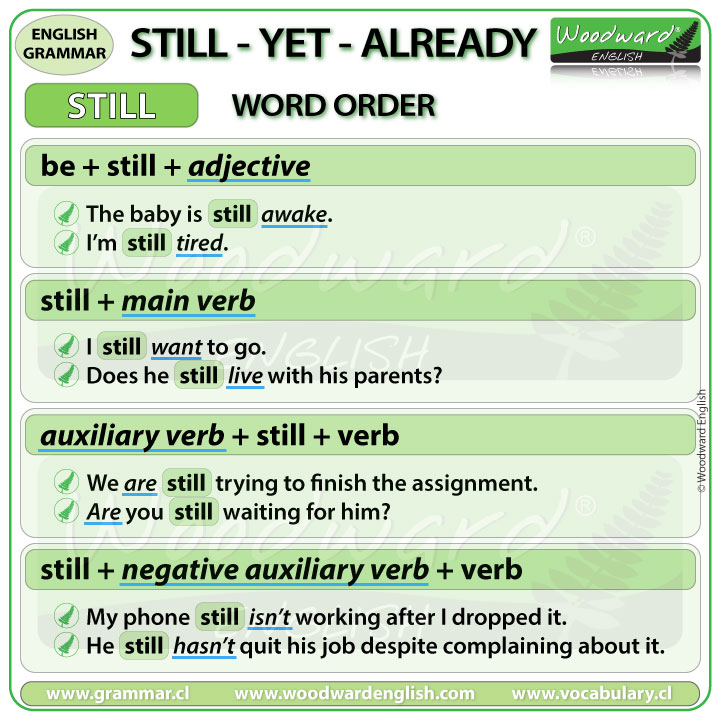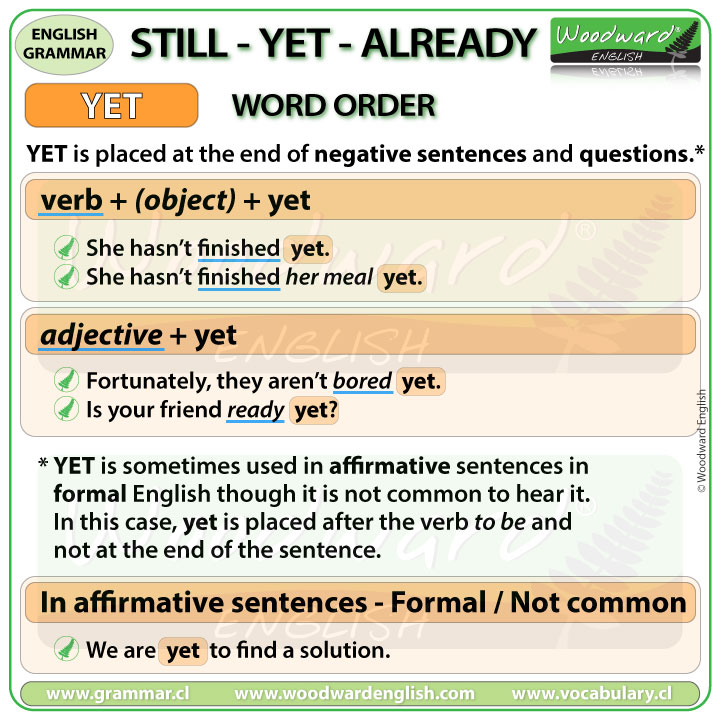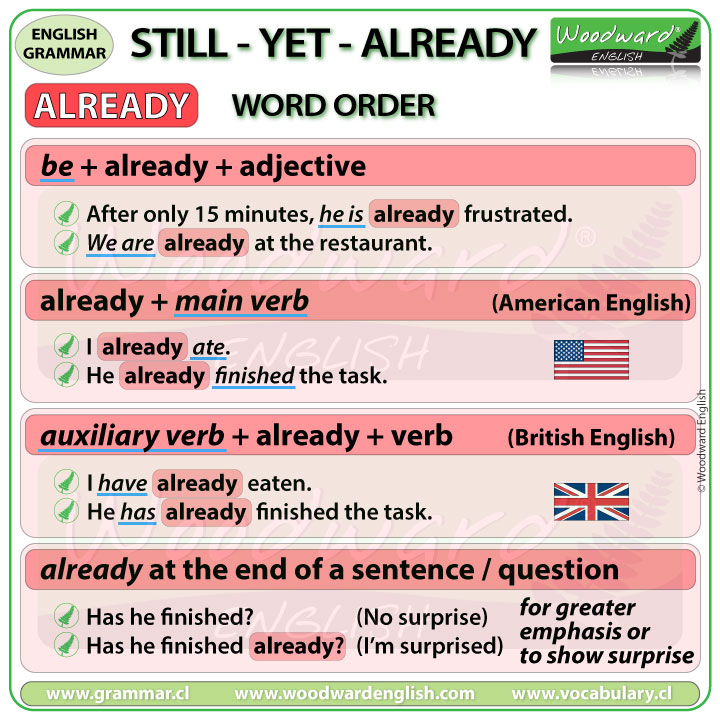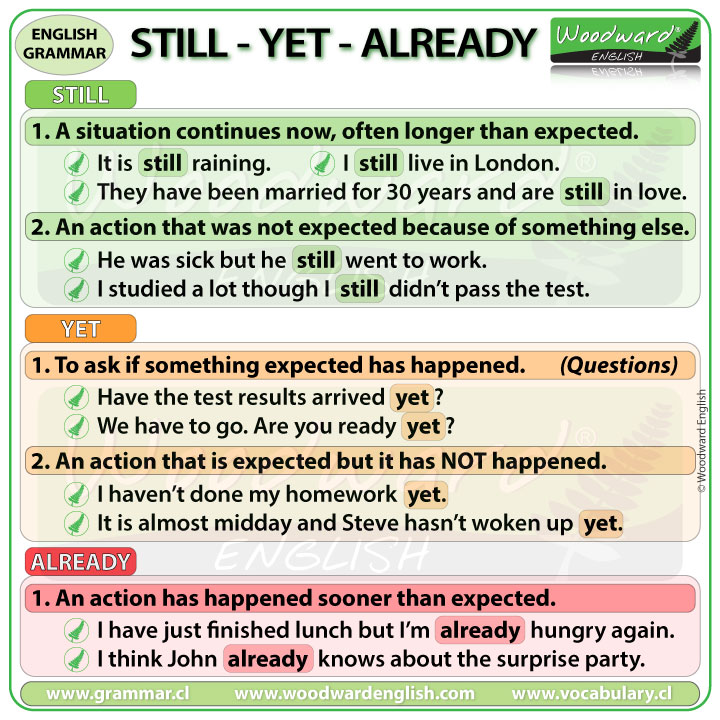Still, yet and already are adverbs of time.
Let’s look at the different meanings and uses of each adverb.
STILL
Still can refer to a situation that continues because it hasn’t finished or stopped.
Sometimes this situation has continued longer than expected or the situation can be surprising.
Still can refer to something that is ongoing.
Example sentences using STILL:
- It is still
(It continues right now. It hasn’t stopped) - I still live in London.
(Maybe you expected me to be living somewhere else now) - They have been married for 30 years and are still in love.
(Their love continues until now) - I can’t go right now because I am still very busy at work.
(I haven’t finished work. I am here longer than expected.) - Will you still love me when I’m old?
(Will you continue to love me?)
Still can refer to an action that was not expected because of something else.
It happened despite what has just been said.
Example sentences using STILL:
- He was sick but he still went to work.
(It was not expected because he could make other people sick at work) - I studied a lot though I still didn’t pass the test.
(I didn’t expect to fail it)
Position of STILL in a sentence
Still is used before a verb or adjective
Be + still + adjective
- The baby is still asleep.
- I’m still tired.
Still + main verb
- I still want to go.
- Does he still live with his parents?
Auxiliary + still + main verb
If the verb has two parts, still goes in the middle between the auxiliary and the verb.
- We are still trying to finish the assignment.
- Are you still waiting for him?
BUT if the sentence is negative, still goes before the negative auxiliary verb.
- He still hasn’t quit his job despite complaining about it every day.
- My phone still isn’t working after I dropped it.

YET
Yet is used in questions and negative sentences.
Yet = now, up to the time of speaking
When YET is used in a question, it is to ask if something (expected) has happened.
Example questions using YET:
- Have the test results arrived yet?
(I expect that they have arrived, I am asking to confirm.) - We have to go. Are you ready yet?
(I expect that you are ready.) - Have you had lunch yet?
(Have you had lunch up to now?)
Yet can refer to an action that is expected (but has not happened). Notice how in this case YET is used at the end of negative sentences.
Example sentences using YET:
- I haven’t done my homework yet.
- It’s almost midday and Steve hasn’t woken up yet.
- My boss hasn’t paid me yet.
Position of YET in a sentence
Verb + (object) + yet
- She hasn’t finished yet. (verb + yet)
- She hasn’t finished her meal yet. (verb + object + yet)
- Have you been to Spain yet?
Adjective + yet
- Fortunately, they aren’t bored yet.
- Is your friend ready yet?
You can see that YET mostly comes at the end of sentence or question. But there is an exception:
YET is sometimes used in affirmative sentences in formal English though it is not common to hear it. In this case, it is not placed at the end of the sentence but after the verb to be.
We have included this use in case you come across it.
- We are yet to find a solution.

ALREADY
Already is used in affirmative sentences, mostly in a perfect tense* or present simple tense.
Already can refer to an action that has happened (sooner than expected).
Already can be used to say that something was completed before something else.
* You may hear/read already used in the Past Simple tense by American English speakers. (More about this difference later)
Example sentences using ALREADY:
- I have just finished lunch but I’m already hungry again. (I didn’t expect to be hungry so soon)
- I think Simon already knows about the surprise party.
- We’ve already seen that movie. Let’s watch another one.
- There are already fifty people lined up outside the door.
Position of ALREADY in a sentence
Already is used before a verb or adjective.
Be + already
- After only 15 minutes, he is already frustrated.
- We are already at the restaurant.
In spoken English, already can be at the end of a sentence for greater emphasis (or to show surprise)
- Has he finished? (No surprise)
- Has he finished already? (I’m surprised)
Now, following word order for YET depends on whether American English or British English is used.
already + main verb
In American English, the word order is already + main verb. This main verb is in the Past simple tense.
- I already ate.
- He already finished the task.
auxiliary verb + already + verb
In British English, the word order is auxiliary verb + already + verb. This verb is a past participle in a Perfect tense.
- I have already eaten.
- He has already finished the task.

Let’s look at this difference a little more…
American English vs. British English
While Yet and Already have the same meaning in American English and British English, you should know that they can be used with different tenses.
In American English, the Past Simple tense is preferred.
In British English, the Present Perfect tense is preferred.
- Did the letter arrive yet? (American English)
- Has the letter arrived yet? (British English)
- Did you already eat your sandwich? (American English)
- Have you already eaten your sandwich? (British English)
Still – Yet – Already
Compare these adverbs in three similar sentences:
- The baby is still asleep.
- The baby is already asleep. (I expected the baby to be awake, the baby fell asleep sooner than I expected)
- The baby isn’t asleep yet. (The baby continues to be awake right now)
Still = continues longer than expected.
Already = sooner than expected.
Yet = it is expected but has not happened.
Summary Chart

